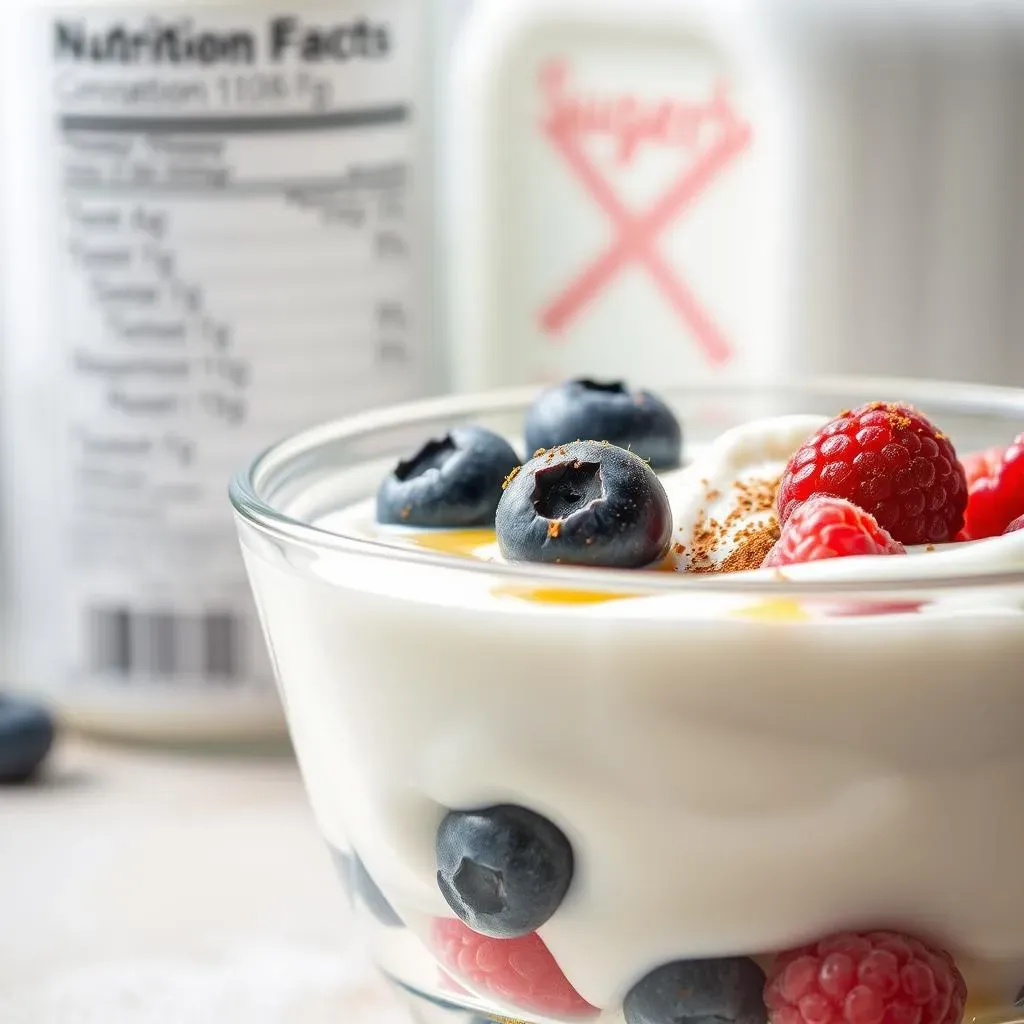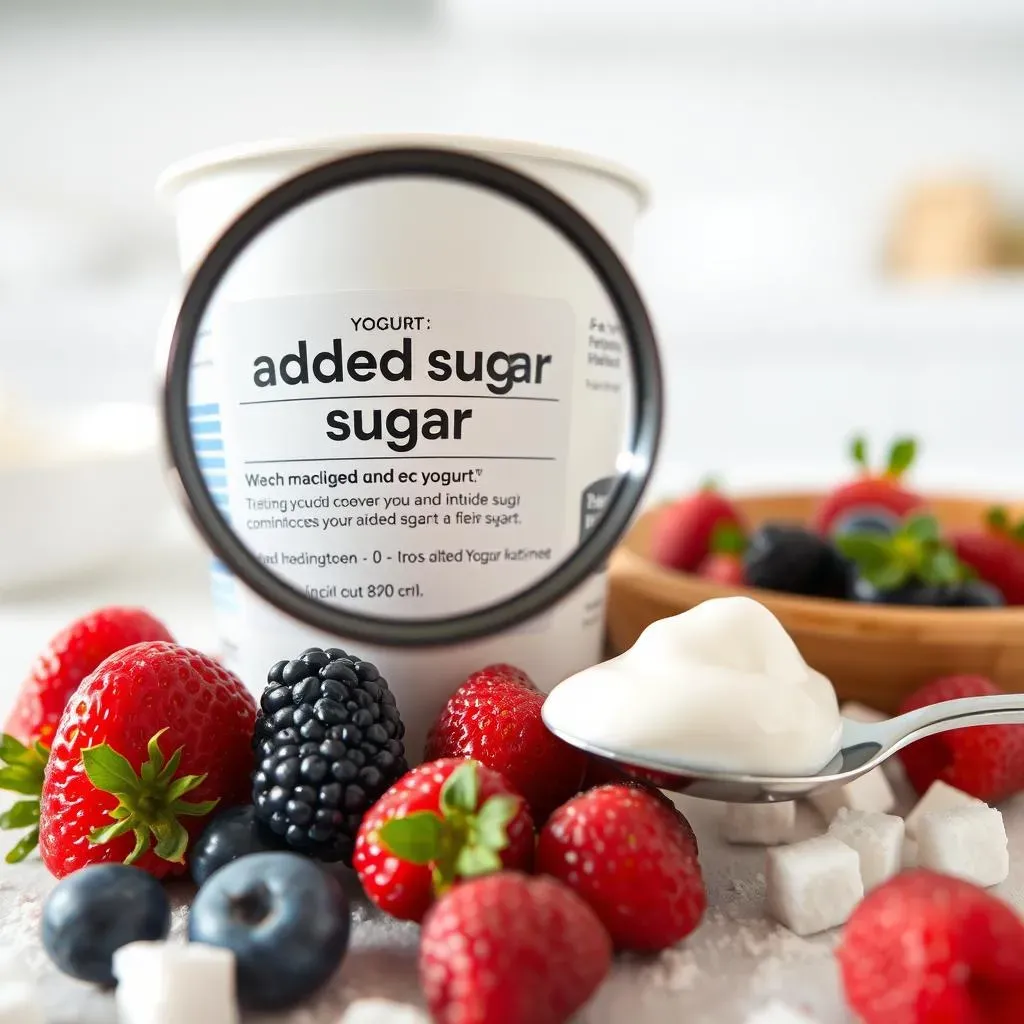Table of Contents
Got cholesterol on your mind? You're not alone! Many of us are constantly trying to navigate the maze of dietary advice, especially when it comes to foods we thought were healthy. Yogurt, for instance, often gets a gold star, but what about the low-fat varieties? The big question on everyone's mind: is low fat yogurt bad for cholesterol? It's a valid concern, considering the conflicting info out there. Some say full-fat is the way to go, while others swear by the low-fat options.
Understanding Cholesterol: The Good, the Bad, and the Dairy

Understanding Cholesterol: The Good, the Bad, and the Dairy
The Basics of Blood Lipids
let's talk cholesterol. It's not some evil substance we need to banish completely. Actually, it's a waxy, fat-like substance that's essential for building cells and making hormones. Your liver cranks out all the cholesterol your body needs, but we also get it from animal-derived foods like meat, poultry, and dairy. The problem arises when we have too much of the "bad" kind.
Think of cholesterol like tiny packages traveling through your bloodstream. These packages are called lipoproteins. There are two main types you need to know about: LDL (low-density lipoprotein) and HDL (high-density lipoprotein). LDL is often referred to as "bad" cholesterol because it can build up in the walls of your arteries, forming plaque. This plaque can narrow your arteries, making it harder for blood to flow through, and increasing your risk of heart attack and stroke. HDL, on the other hand, is the "good" cholesterol. It acts like a cleanup crew, helping to remove LDL from your arteries and transport it back to the liver for disposal.
LDL vs. HDL: Knowing Your Numbers
So, what are healthy cholesterol levels? Here's a quick cheat sheet:
Type of Cholesterol | Desirable Level |
|---|---|
Total Cholesterol | Less than 200 mg/dL |
LDL Cholesterol | Less than 100 mg/dL (lower is better, especially if you have heart disease) |
HDL Cholesterol | 60 mg/dL or higher |
These are general guidelines, and your doctor may have specific recommendations based on your individual health profile. It's important to get your cholesterol checked regularly, especially if you have a family history of heart disease, are overweight, or have other risk factors like diabetes or high blood pressure.
Dairy's Role: Fat Content and Cholesterol
Now, let's bring dairy into the picture. Dairy products, including yogurt, naturally contain cholesterol and saturated fat. Saturated fat can raise LDL cholesterol levels in some people. That's why health guidelines often recommend choosing low-fat or non-fat dairy options.
But here's where things get interesting. Recent research suggests that the relationship between saturated fat and cholesterol might be more complex than we previously thought. Some studies have even shown that full-fat dairy may not be as detrimental to cholesterol levels as once believed. However, for most people, especially those with high cholesterol, opting for low-fat or non-fat dairy is still a prudent choice. And that brings us back to our original question: is low-fat yogurt bad for cholesterol? We'll explore that in the next section.
LowFat Yogurt: A CholesterolConscious Choice?

LowFat Yogurt: A CholesterolConscious Choice?
The Low-Down on Low-Fat
so we know that full-fat dairy contains saturated fat, which *can* raise LDL cholesterol. That's where low-fat yogurt steps in as a potential heart-healthy alternative. By choosing low-fat or non-fat yogurt, you're significantly reducing your intake of saturated fat, which, in theory, should help keep your cholesterol levels in check. Makes sense, right? It's a pretty straightforward swap, and it's often recommended by doctors and dietitians for people watching their cholesterol.
But it's not *just* about cutting fat. Low-fat yogurt still provides a good source of protein, calcium, and other essential nutrients. Protein helps you feel full and satisfied, which can be beneficial for weight management, and calcium is crucial for bone health. So, you're not sacrificing essential nutrients by opting for the low-fat version. In fact, you might even be making a smarter choice overall. However, the key is to be mindful of what *else* is in your yogurt, which we'll get to in a bit.
Potential Pitfalls: Sugar and Sneaky Additives
Here's the catch: not all low-fat yogurts are created equal. When manufacturers remove fat from yogurt, they often compensate by adding sugar, artificial sweeteners, and other additives to improve the taste and texture. And that's where things can get dicey. Excessive sugar intake can lead to a whole host of health problems, including weight gain, insulin resistance, and, yes, even elevated cholesterol levels. In fact, some studies have shown that high sugar intake can actually raise LDL cholesterol and lower HDL cholesterol – the exact opposite of what you're trying to achieve!
So, before you grab that brightly colored, fruit-on-the-bottom low-fat yogurt, take a peek at the nutrition label. Look for added sugars like sucrose, fructose, corn syrup, and dextrose. Ideally, you want to choose a yogurt with minimal added sugar. Plain, non-fat yogurt is always the best option, as it contains no added sugar. You can then sweeten it yourself with fresh fruit, a drizzle of honey, or a sprinkle of cinnamon. That way, you're in control of the ingredients and can avoid those sneaky additives.
The Probiotic Power of Yogurt and Its Impact on Cholesterol

The Probiotic Power of Yogurt and Its Impact on Cholesterol
What are Probiotics and Why Do They Matter?
so we've talked about fat and sugar, but there's another key player in the yogurt game: probiotics! Probiotics are live microorganisms – the "good" bacteria – that can benefit your health when consumed in adequate amounts. They're naturally found in fermented foods like yogurt, kefir, sauerkraut, and kimchi. These beneficial bacteria set up shop in your gut, helping to maintain a healthy balance of gut flora. And a healthy gut is linked to all sorts of good things, from improved digestion and immunity to even better mental health.
But what does this have to do with cholesterol? Well, research suggests that certain strains of probiotics can actually help lower cholesterol levels. How? Some probiotics can bind to cholesterol in the gut, preventing it from being absorbed into the bloodstream. Others can break down bile acids, which are made from cholesterol, forcing the body to use more cholesterol to create new bile acids. It's like a little cholesterol-lowering factory working right in your gut!
Which Probiotics Pack the Most Punch?
Not all probiotics are created equal. Different strains have different effects, and some are more effective at lowering cholesterol than others. Some of the most promising strains include Lactobacillus acidophilus, Bifidobacterium lactis, and Lactobacillus reuteri. These strains have been shown in studies to reduce both total cholesterol and LDL ("bad") cholesterol. The cool thing is that many yogurt brands now list the specific strains of probiotics they contain on the label. So, you can actually choose a yogurt that's specifically formulated to support healthy cholesterol levels.
However, it's important to note that the amount of probiotics in yogurt can vary widely. Some yogurts may contain only a small amount, while others are packed with billions of live cultures. To get the most benefit, look for yogurts that are labeled as "live and active cultures" and that contain a high count of probiotic strains known to be effective for cholesterol reduction. And remember, consistency is key! You need to eat yogurt regularly to maintain a healthy population of beneficial bacteria in your gut. It's not a one-time fix, but a long-term strategy for supporting your overall health.
Decoding Yogurt Labels: Navigating Sugar and Additives for Heart Health

Decoding Yogurt Labels: Navigating Sugar and Additives for Heart Health
The Sugar Showdown: Spotting Sweet Deception
Alright, label detectives, let's get to work! The first thing you want to scope out on a yogurt label is the sugar content. Now, remember that yogurt naturally contains some sugar in the form of lactose, which is milk sugar. So, you'll see *some* sugar listed, but you want to focus on the "added sugars" section. This is where manufacturers sneak in extra sweeteners to make the yogurt more palatable. And trust me, they can get pretty creative with their sugar sources!
Keep an eye out for sneaky aliases like sucrose, fructose, corn syrup, dextrose, honey, agave nectar, and even fruit juice concentrate. All of these are forms of added sugar that can contribute to weight gain, insulin resistance, and, yes, elevated cholesterol levels. The American Heart Association recommends limiting added sugar intake to no more than 25 grams per day for women and 36 grams per day for men. So, factor that into your yogurt choice! Aim for yogurts with as little added sugar as possible – ideally, less than 5 grams per serving. Plain, unsweetened yogurt is always the best bet, as it gives you complete control over the sweetness.
Beyond Sugar: Navigating the Additive Jungle
we've conquered the sugar monster, but our label-reading journey isn't over yet! It's time to venture into the additive jungle. This is where manufacturers add ingredients to improve the texture, shelf life, and overall appeal of their yogurt. And while some additives are harmless, others can be potentially problematic, especially if you're trying to maintain a healthy diet.
Some common additives to watch out for include artificial sweeteners (like aspartame, sucralose, and saccharin), artificial flavors, artificial colors, and thickeners (like modified food starch, guar gum, and carrageenan). Artificial sweeteners can disrupt your gut microbiome and may even stimulate your appetite, leading to increased calorie intake. Artificial flavors and colors offer no nutritional value and can sometimes trigger allergic reactions in sensitive individuals. Thickeners are generally safe, but some people may experience digestive issues like bloating or gas from certain types. The bottom line? The fewer additives, the better. Choose yogurts with a short and simple ingredient list, focusing on whole, recognizable ingredients. Your heart (and your gut) will thank you!
Ingredient | Why to Watch Out | Healthier Alternative |
|---|---|---|
High Fructose Corn Syrup | Contributes to insulin resistance and weight gain | Fresh Fruit |
Artificial Sweeteners (Aspartame, Sucralose) | May disrupt gut microbiome | Stevia or Monk Fruit (in moderation) |
Artificial Colors | Potential allergic reactions | None needed! Embrace the natural color |
Incorporating LowFat Yogurt into a CholesterolFriendly Diet

Incorporating LowFat Yogurt into a CholesterolFriendly Diet
Breakfast Bliss: Yogurt Parfaits and Smoothie Sensations
So, you're armed with all this knowledge about low-fat yogurt and cholesterol. Now, how do you actually *use* it? Let's start with breakfast, the most important meal of the day! Low-fat yogurt is a fantastic base for a healthy and satisfying breakfast that can help keep your cholesterol in check. One of my favorite options is a yogurt parfait. Simply layer plain, non-fat yogurt with berries, a sprinkle of granola (choose one that's low in added sugar!), and a drizzle of honey or maple syrup (optional). The berries provide antioxidants and fiber, the granola adds a bit of crunch, and the yogurt delivers protein and probiotics. It's a win-win-win!
Another great option is a yogurt smoothie. Blend plain, low-fat yogurt with your favorite fruits (like bananas, berries, or mangoes), a handful of spinach or kale (for extra nutrients), and a splash of almond milk or water to thin it out. You can also add a scoop of protein powder for an extra boost. Smoothies are a quick and easy way to get a nutritious breakfast on the go. Just be mindful of the sugar content, especially if you're using a lot of fruit. And remember, plain yogurt is your friend! It allows you to control the sweetness and avoid those sneaky added sugars.
Lunch and Beyond: Savory Yogurt Applications
Yogurt isn't just for breakfast! It can also be a delicious and healthy addition to your lunch and even dinner. Think outside the sweet box and explore some savory yogurt applications. For example, you can use plain, low-fat Greek yogurt as a healthier alternative to sour cream or mayonnaise in dips, dressings, and sauces. It adds a creamy tang without all the extra fat and calories. Try mixing it with herbs, spices, and lemon juice for a flavorful dip for veggies or a topping for grilled chicken or fish.
Another great option is to use yogurt as a marinade for meat or poultry. The acidity of the yogurt helps to tenderize the meat and infuse it with flavor. Simply combine plain yogurt with your favorite spices and herbs, and marinate your meat in the refrigerator for at least 30 minutes (or even overnight). Then, grill, bake, or pan-fry as usual. You'll be amazed at how tender and flavorful your meat becomes! And, of course, you can always enjoy a simple bowl of plain yogurt with some chopped vegetables and a sprinkle of herbs for a light and refreshing lunch. Get creative and experiment with different flavors and textures to find your favorite savory yogurt combinations.
Meal | Yogurt Idea | Benefit |
|---|---|---|
Breakfast | Yogurt parfait with berries and granola | High in fiber, antioxidants, and probiotics |
Lunch | Yogurt-based dip for vegetables | Creamy, low-fat alternative to traditional dips |
Dinner | Yogurt marinade for chicken or fish | Tenderizes meat and adds flavor |
Smart Snacking: Yogurt as a Cholesterol-Conscious Treat
Snacking can be a slippery slope when it comes to cholesterol. It's easy to reach for processed foods that are high in saturated fat, sugar, and sodium. But yogurt can be a smart and satisfying snack that helps keep your cholesterol in check. The key is to choose wisely and avoid those sugary, additive-laden options. Instead, opt for plain, low-fat yogurt and add your own healthy toppings. Some great ideas include fresh fruit, chopped nuts (in moderation, as they are high in calories), seeds (like chia or flax seeds), and a sprinkle of cinnamon.
You can also make your own healthy yogurt popsicles by freezing plain yogurt with fruit and a touch of honey or maple syrup. These are a refreshing and guilt-free treat on a hot day. Another option is to make a yogurt-based dip for fruit or vegetables. Mix plain yogurt with a little peanut butter or almond butter for a protein-packed dip that will keep you feeling full and satisfied. The possibilities are endless! The important thing is to be mindful of your choices and to make yogurt a regular part of your cholesterol-friendly snacking routine. Your heart will thank you for it!
The Bottom Line: Low-Fat Yogurt and Your Cholesterol
So, is low fat yogurt bad for cholesterol? The short answer is generally no. In fact, when chosen wisely, low-fat yogurt can be a beneficial part of a cholesterol-lowering diet. The key is to look for options that are low in added sugars and saturated fats, and packed with probiotics. While more research is always welcome, current evidence suggests that yogurt, especially when it's low-fat and probiotic-rich, can contribute to a healthier cholesterol profile. Remember, it's all about balance and making informed choices that fit your individual needs and dietary goals. So go ahead, enjoy that cup of yogurt – your heart might just thank you for it!
